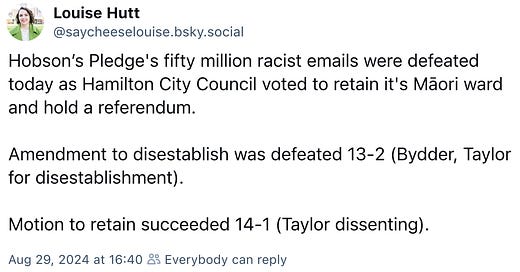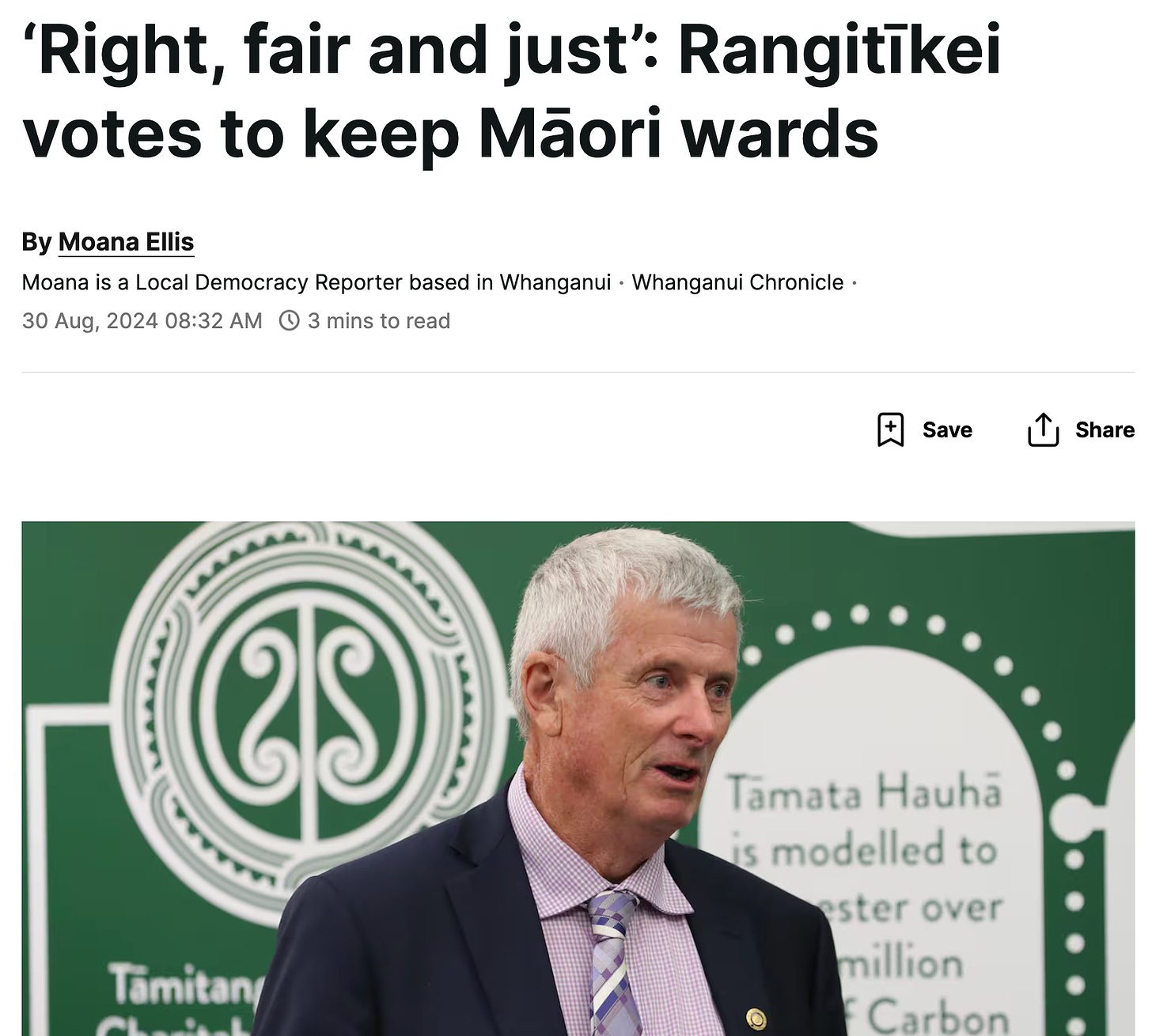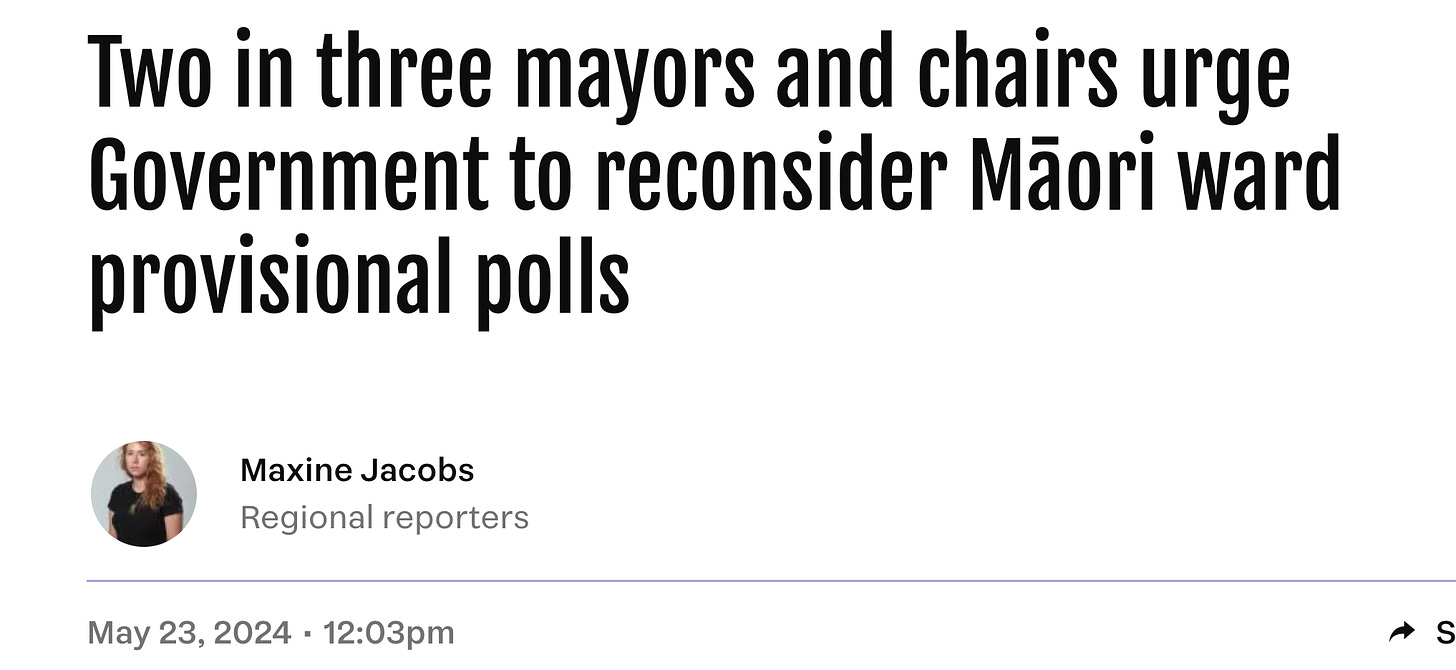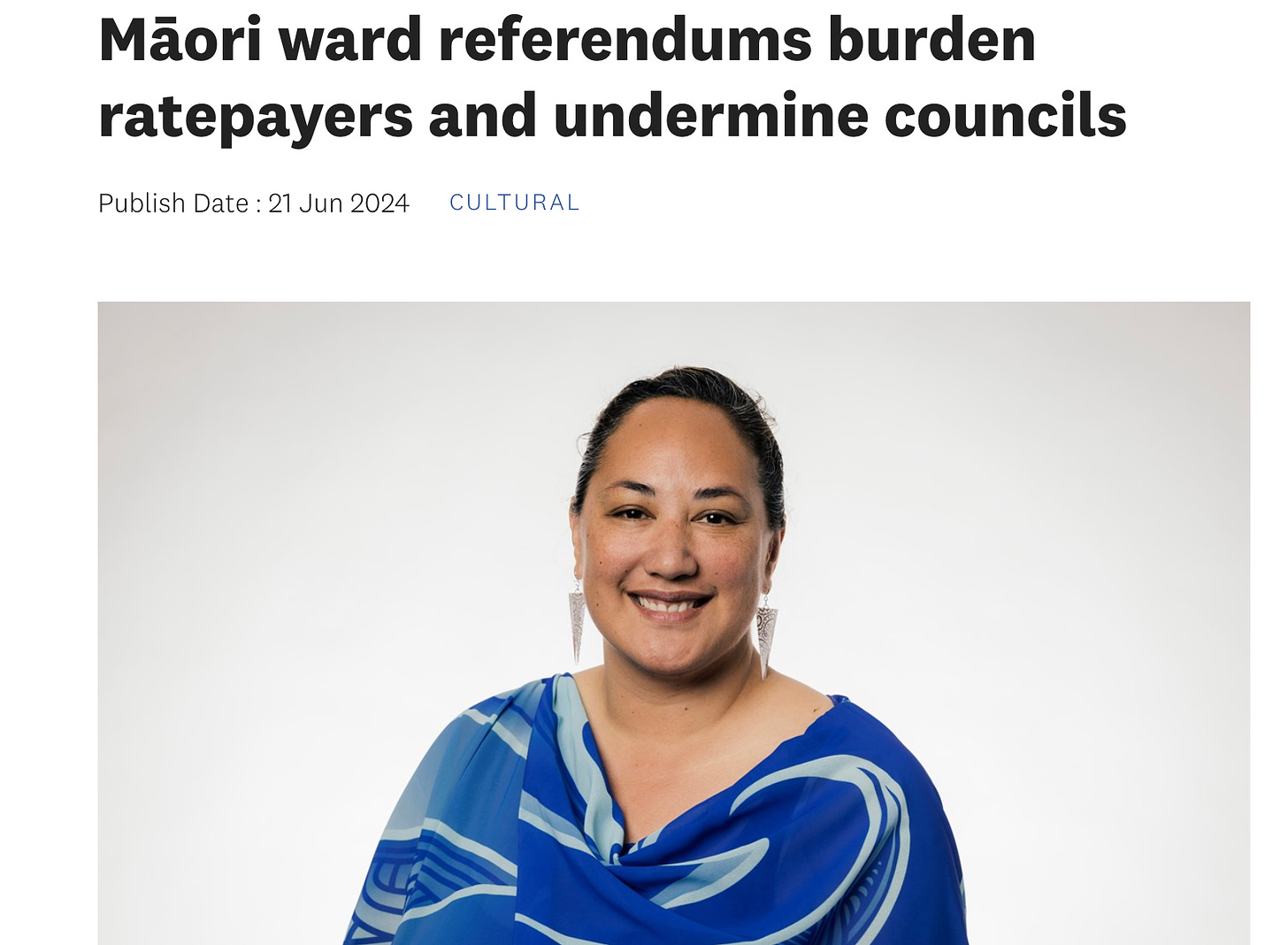Open to all - deep thanks to those who support and subscribe.
One of the things that has got me interested recently is updates about Māori wards.
In April, Stuff’s Karanama Ruru reported that ~ 2/3 of our 78 councils had adopted Māori wards in NZ.
That meant that under the Coalition repeal of Labour’s law, those 44 would now be forced to voluntarily get rid of Māori wards or put it to a 2025 referendum. (One council has the choice to wait until 2028.)
Simeon Brown made his formal announcement earlier in the year:
The Coalition Government will reverse the previous government’s divisive changes that denied local communities the ability to determine whether to establish Māori wards.
No Right Turn has a running tab on the results, and we are also seeing direct updates from around the country
Two days ago, I noted we were 18 on 20 i.e. 90% of voting Councils kept the wards.
Today we are at 29 out of 31 i.e. 94%.
So far, only Kaipara District Council has chosen to disestablish their Māori ward. Upper Hutt rescinded its original decision to have them too.
Yet more interestingly, No Right Turn writes:
The opposition is (coming) from provincial and rural councils - National's base.
In Palmerston North, the mayor and all National councillors opposed the government. In the Manawatū-Whanganui Regional Council, the most vocal opponent was Jono Naylor, a former National MP.
And the reason for this is simple: like the Māori seats, Māori wards work, and once they exist, everyone can see it. Which is I suspect what racist National was afraid of.
Now some of you may remember that Palmy North’s Grant Smith even went on to Sean Plunkett’s The Platform in May to try to explain why keeping Māori wards is actually good for NZ and communities - but he was taken down by an aggressive Plunkett who wanted nothing to do with hearing it.
Notwithstanding that, it seems the double speak campaign is faltering.
I particularly enjoyed the reporting coming out of the Horizons Regional Council vote (emphasis mine) -
Deputy chair Jono Naylor said the value of the council’s two Māori constituencies spoke for itself. “Our understanding around this table over the last almost two years has grown because of the presence of Te Kenehi [Teira] and Jim [Edmonds] at our table. We’re all the better for that.”
But he was deeply concerned that the decision would force a binding poll.
“I’m really disturbed by that – the actual racist nature of the legislation that makes us do that.
“We don’t have to have binding polls about any of our other constituencies. We just pick on the Māori one. If there was to be a poll, the only people who should be polled would be those on the Māori roll to decide for themselves if that’s how they want to do it.”
Naylor said the issue was not about treating everyone the same but about seeking equal outcomes.
“If we want Māori to prosper and have the same outcomes as non-Māori then sometimes we’ve got to do things a little bit differently.
“This is the right thing to do and our region is better if we keep following that path.”
Chair Rachel Keedwell said she was incensed by Government changes to Māori ward and constituency rules.
“I take the description of the legislation as being racist one step further.
“Not only do we not need a binding poll on any other type of constituency, but we don’t need one if we choose to disestablish the Māori constituencies. We only need it if we are choosing to establish it. That’s very one-directional…
Keedwell highlighted “the hypocrisy coming down from central government, interfering in how we choose to set our own representation arrangements”.
Astute points that cut right through to the heart of what is happening.
The report goes on to higlight community concerns about the costs to run community referendums.
And they’re valid -
Greater Wellington reports that their referendum will cost ratepayers $350,000. And Wellington’s one up to $200,000.
Simeon Brown’s response? After some authoritative admonishment to Councils, he lectures:
“Councils should not be afraid of asking their constituents what they think with a referendum – the ultimate form of localism.”
Sent via email.
Still - the results speak for themselves. 94% have rejected the Coalition government’s racist legislation effort.
And although Councils can anticipate Hobsons Pledge and Jordan Williams/David Farrar efforts to run interference during referendums next year, so far the sparks are bright.
Happy weekend everyone. And have a great rest of day too.
Tui
PS Councils had pleaded before and during the select committee process for the government not to impose the Māori ward legislation and costs on them. The pro-localism National led government ignored it all.









🤔Is there an award for hypocrisy in govt? Surely Luxon's outrageous lecturing of local govt people to "rein in the fantasies" sticking to the "need to haves" and living within their means and "a limit on so-called non-core" activities is the definition of wasting money on a referendum only his racist mates want, would be right up there in contention 😱
Absolutely having Maori representation has been beneficial with both widening shared understandings, and educating non-Maori about particularly environment impacts on the health & well-being of not only the rivers, but those who rely on them for traditional food & resource gathering. * Many a whanau is healthier & better fed by having access to traditional food sources - isn't that what NACT1st (or my new favourite, the Coalition of Cockwombles (CoC)) want of people? More self reliance? 🤷 (*BTW - not theoretical but real-life observation & results based in my case)
Wouldn't it be a glorious thing, if those councils collectively gave slimy brown the middle finger. Well done them.
Sure the govt could withhold funds to them, but I'd suggest that the populaces' anger would stop that happening.